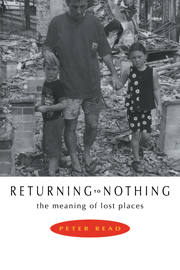Book contents
- Frontmatter
- Contents
- Dedication
- Preface
- Acknowledgments
- 1 Losing Windermere Station
- 2 Vanished Homelands
- 3 Namadgi: Sharing the High Country
- 4 Two Dead Towns
- 5 Home: The Heart of the Matter
- 6 Empty Spaces: The Inundation of Lake Pedder
- 7 Darwin Rebuilt
- 8 Losing a Neighbourhood
- 9 That Place
- Notes
- References
- Index
7 - Darwin Rebuilt
Published online by Cambridge University Press: 05 November 2011
- Frontmatter
- Contents
- Dedication
- Preface
- Acknowledgments
- 1 Losing Windermere Station
- 2 Vanished Homelands
- 3 Namadgi: Sharing the High Country
- 4 Two Dead Towns
- 5 Home: The Heart of the Matter
- 6 Empty Spaces: The Inundation of Lake Pedder
- 7 Darwin Rebuilt
- 8 Losing a Neighbourhood
- 9 That Place
- Notes
- References
- Index
Summary
The condensation heat energy released by a tropical cyclone in a day can supply the electrical needs of the United States for six months. The same energy released upon Darwin during the night of 24-25 December 1974 flattened the city. Darwin is rebuilt—unlike Adaminaby—on the same site, but it is not the same city. Former residents who returned for the twentieth anniversary commemorations in 1994 found much of the city and suburbs unrecognisable. Yet while the Pedder conservationists failed to save their lake from destruction, Darwin residents preserved their city, not from the cyclone but from the uniformalising plans of city developers. Darwin's rebuilding took very much the forms which its citizens wanted.
Residents of pre-cyclone Darwin recall the easy pace of life, the absence of traffic lights and rush-hour tensions, the toleration of ethnic differences, the social life in gardens or under the stilts of the raised houses. In the 1960s it was possible to walk up the main thoroughfare and know almost everyone by name or face. In old Darwin, according to trade union official Curly Nixon, ‘you never got an invitation to a party but you got abused if you didn't go’. The less romantic recall rougher aspects. Botanist George Brown found Darwin to be a maledominated and hard-drinking town. He had his first fight soon after he arrived in the mid 1960s when he walked into Fannie Bay Hotel ‘where a bloke walked up to me and said “Can you fight?” And I said, “Well I can but I don't want to.”
Information
- Type
- Chapter
- Information
- Returning to NothingThe Meaning of Lost Places, pp. 148 - 171Publisher: Cambridge University PressPrint publication year: 1996
